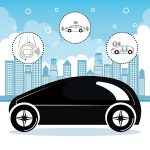1. Introduction
With the growing concern for environmental sustainability and the rising cost of fuel, more drivers are considering alternatives to traditional gasoline-powered cars. Two of the most popular options today are hybrid and fully electric vehicles. But how do these two types of cars differ, and which one is the right choice for you?
Hybrid cars combine a gasoline engine with an electric motor to improve fuel efficiency and reduce emissions. They don’t need to be plugged in, as their batteries are charged through regenerative braking and the internal combustion engine. Fully electric cars (EVs), on the other hand, run solely on electricity and require charging from an external power source, such as a home charger or public charging station.
Growing Popularity of Hybrid and Electric Cars
In recent years, hybrid and electric vehicles have gained significant popularity due to advancements in battery technology, increased availability of charging stations, and government incentives that encourage eco-friendly transportation. Automakers are investing heavily in these technologies, making hybrids and EVs more accessible and affordable than ever.
Market Growth
According to industry reports, sales of hybrid and electric vehicles have surged in the past decade. Consumers are drawn to their lower operating costs, reduced environmental impact, and modern technology features.
Why They Matter
As cities and governments impose stricter emission regulations and aim for carbon neutrality, hybrid and electric vehicles play a crucial role in reducing global reliance on fossil fuels. Choosing between these two options depends on factors such as driving habits, infrastructure availability, and budget.
Key Differences at a Glance
| Feature | Hybrid Cars | Fully Electric Cars |
|---|---|---|
| Power Source | Gasoline & Electricity | Electricity Only |
| Charging | No external charging required | Requires external charging station |
| Fuel Efficiency | Better than gasoline cars | No gasoline needed |
| Range | Longer due to gasoline backup | Dependent on battery size & charging availability |
| Emissions | Lower than gas cars, but still present | Zero emissions |
Both hybrid and fully electric cars offer distinct advantages, and understanding their differences can help you determine which option aligns best with your needs and lifestyle. In the following sections, we will explore the benefits, drawbacks, costs, and considerations of each type in greater detail.
2. How Hybrid and Fully Electric Cars Work
When choosing between a hybrid and a fully electric car, its important to understand how they work. Both vehicle types use electricity to improve efficiency, but they operate differently. Lets break down the key differences between hybrid and electric vehicles.
Power Sources: How Do They Generate Energy?
Hybrid Vehicles (HEVs and PHEVs)
Hybrid vehicles use both a gasoline engine and an electric motor. There are two main types:
- Hybrid Electric Vehicles (HEVs): These cars cannot be plugged in to charge. Instead, they use regenerative braking and the gasoline engine to recharge the battery while driving.
- Plug-in Hybrid Electric Vehicles (PHEVs): These have a larger battery and can be charged by plugging into an external power source. They can drive a short distance on electric power alone before switching to gasoline.
Fully Electric Vehicles (EVs)
Electric vehicles run entirely on electricity. They have no gasoline engine and must be plugged into a charging station or home charger. Unlike hybrids, EVs rely solely on battery power for propulsion.
Efficiency Comparison
Hybrids and EVs have different levels of efficiency depending on driving conditions and fuel usage.
| Vehicle Type | Power Source | Fuel Efficiency |
|---|---|---|
| Hybrid (HEV) | Gasoline + Electric Battery (Self-Charging) | Better fuel economy than traditional gas cars |
| Plug-in Hybrid (PHEV) | Gasoline + Plug-in Electric Battery | Can drive some miles on electricity before using gas |
| Fully Electric Vehicle (EV) | Electric Battery Only | No gas usage, highly efficient |
Which One is More Efficient?
In general, fully electric cars are more efficient because they do not rely on gasoline. However, hybrids offer flexibility, allowing drivers to refuel at gas stations while still benefiting from lower emissions and better fuel economy. The right choice depends on your driving habits and charging availability.
![]()
3. Pros and Cons of Hybrid Cars
Hybrid cars offer a mix of gasoline and electric power, giving drivers a balance between fuel efficiency and convenience. However, they come with both advantages and disadvantages. Below is a breakdown of the key pros and cons of hybrid vehicles.
Pros of Hybrid Cars
✅ Better Fuel Efficiency
Hybrid cars use both a gasoline engine and an electric motor, reducing fuel consumption. This can lead to better gas mileage compared to traditional gas-powered vehicles, especially in city driving where regenerative braking helps recharge the battery.
✅ Extended Driving Range
Unlike fully electric cars that depend entirely on battery power, hybrids can switch to gasoline when the battery runs low. This eliminates range anxiety, making long-distance travel simpler without worrying about charging stations.
✅ Lower Emissions
Compared to conventional gas-powered cars, hybrids produce fewer emissions. Since they use electricity alongside gasoline, they contribute to cleaner air and reduced carbon footprint.
✅ Potential Cost Savings
With improved fuel efficiency, drivers spend less money on gas. Some hybrid models also qualify for tax credits and incentives, reducing the overall cost of ownership.
Cons of Hybrid Cars
❌ Higher Upfront Costs
Hybrid cars tend to be more expensive than their traditional gas-powered counterparts. While fuel savings can help offset the price, the initial investment is still higher.
❌ Battery Replacement Costs
Hybrid batteries are designed to last a long time, but replacing them can be costly when they eventually wear out. Depending on the model, a new hybrid battery can cost thousands of dollars.
❌ Maintenance Complexity
Because hybrids use both gasoline and electric power, their systems can be more complex than regular cars. This may lead to higher repair costs and the need for specialized mechanics.
❌ Less Electric-Only Driving
Unlike fully electric cars, hybrids still rely on gasoline for part of their operation. While they do reduce fuel consumption, they don’t eliminate it completely.
Comparison Table: Hybrid Cars Pros and Cons
| Pros | Cons |
|---|---|
| Better fuel efficiency | Higher upfront cost |
| Extended driving range | Battery replacement costs |
| Lower emissions | More complex maintenance |
| Potential fuel savings | Limited electric-only driving |
Hybrid cars are a great choice for those looking to save on gas while reducing emissions, but they also come with certain drawbacks like higher purchase prices and maintenance costs. Understanding both the benefits and downsides can help you decide if a hybrid car is the right fit for your lifestyle.
4. Pros and Cons of Fully Electric Cars
Fully electric cars, also known as EVs (electric vehicles), are becoming increasingly popular as technology improves and charging infrastructure expands. However, just like hybrid cars, they come with their own advantages and challenges. Lets take a closer look at the pros and cons of fully electric vehicles.
Advantages of Fully Electric Cars
Lower Running Costs
One of the biggest advantages of EVs is that they are much cheaper to run than gasoline or even hybrid cars. Electricity generally costs less than fuel, and maintenance expenses are lower because EVs have fewer moving parts and don’t require oil changes.
Eco-Friendly and Zero Emissions
Since EVs run entirely on electricity, they produce no tailpipe emissions, making them an environmentally friendly option. If you charge your EV using renewable energy sources, you reduce your carbon footprint even further.
Smooth and Quiet Drive
Electric cars offer a smooth, quiet, and responsive ride because they don’t have an internal combustion engine. The instant torque from electric motors also provides quick acceleration.
Challenges of Fully Electric Cars
Range Anxiety
One of the main concerns for EV owners is range anxiety, or the fear of running out of battery before finding a charging station. While newer electric cars offer longer ranges, they still generally cant match the driving range of gas-powered vehicles.
Charging Infrastructure
Unlike gas stations, EV charging stations are still not as widely available, especially in rural areas. Charging also takes longer than refueling a gasoline car, depending on the type of charger used.
Battery Life and Replacement Costs
EV batteries degrade over time, although most modern electric cars are designed to last for many years. However, replacing a battery pack can be expensive, though prices are gradually decreasing as technology advances.
Higher Upfront Cost
Fully electric cars typically have a higher purchase price than gas or hybrid vehicles. Although tax incentives and savings on fuel and maintenance can help offset this cost, the initial investment might be a barrier for some buyers.
Comparison of Fully Electric Car Pros and Cons
| Pros | Cons |
|---|---|
| Lower running costs | Higher upfront cost |
| Zero emissions | Limited charging infrastructure |
| Quiet and smooth driving experience | Range anxiety |
| Less maintenance | Battery degradation over time |
While fully electric vehicles offer great benefits in terms of cost savings and environmental impact, there are still some challenges that potential buyers should consider. Understanding both the pros and cons can help you decide if an EV is the right choice for your driving needs.
5. Which One Is Right for You?
Choosing between a hybrid and a fully electric car depends on several factors, including your driving habits, budget, charging accessibility, and environmental priorities. Here’s how to decide which option suits you best.
🔹 Driving Habits
Consider how and where you drive most often. Your daily commute, road trip frequency, and typical driving distance all play a role in making the right choice.
| Driving Style | Best Choice | Why? |
|---|---|---|
| Short city commutes | Fully Electric | EVs perform well in stop-and-go traffic and require no gas. |
| Frequent long-distance travel | Hybrid | Hybrids offer extended range by combining gas and electric power. |
| Occasional longer trips | Fully Electric | With proper planning and access to chargers, EVs can handle long trips. |
💰 Budget
The upfront cost of an electric vehicle is typically higher, but long-term savings on fuel and maintenance can balance it out. Hybrids usually have a lower initial price but still require gas.
| Factor | Hybrid | Fully Electric |
|---|---|---|
| Upfront Cost | Typically lower | Higher due to battery technology |
| Fuel Costs | Lower than gas-only cars but still requires gas | Significantly lower, especially with home charging |
| Maintenance | Moderate – engine maintenance required | Lower – fewer moving parts and no oil changes |
⚡ Charging Accessibility
How easily you can charge an EV is a crucial factor. If you have a home charging setup or access to public chargers, a fully electric car can be convenient. Hybrids, on the other hand, don’t rely on charging infrastructure.
Consider These Questions:
- Do you have a home charging station, or can you install one?
- Are there sufficient public charging stations on your common routes?
- How frequently do you take long trips where charging time might be a concern?
🌎 Environmental Concerns
If reducing your carbon footprint is a top priority, an EV is the best option since it produces zero tailpipe emissions. However, hybrids still offer better fuel efficiency than traditional gas-powered cars.
Emissions Comparison
- Hybrid: Lower emissions than gas-only vehicles but still relies on fossil fuels.
- Fully Electric: Zero emissions while driving, but electricity source matters.
Ultimately, the best choice depends on your personal needs and lifestyle. Weigh these factors carefully to determine which option fits you best.


